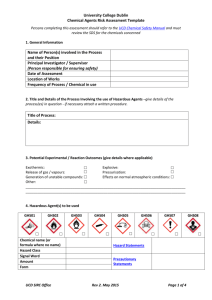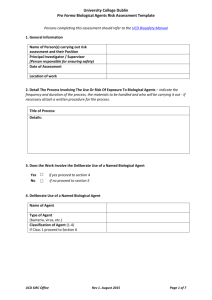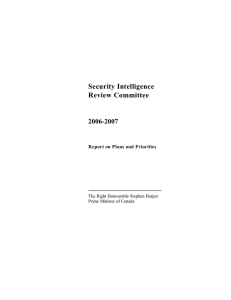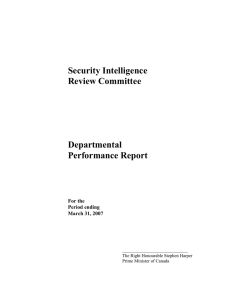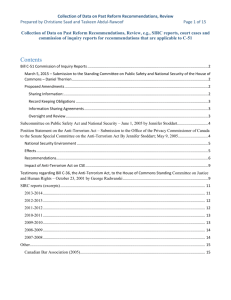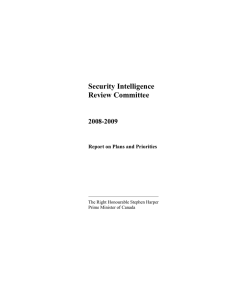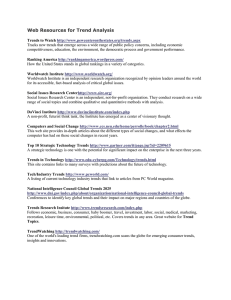Security Intelligence Review Committee 2007-2008 Report on Plans and Priorities
advertisement
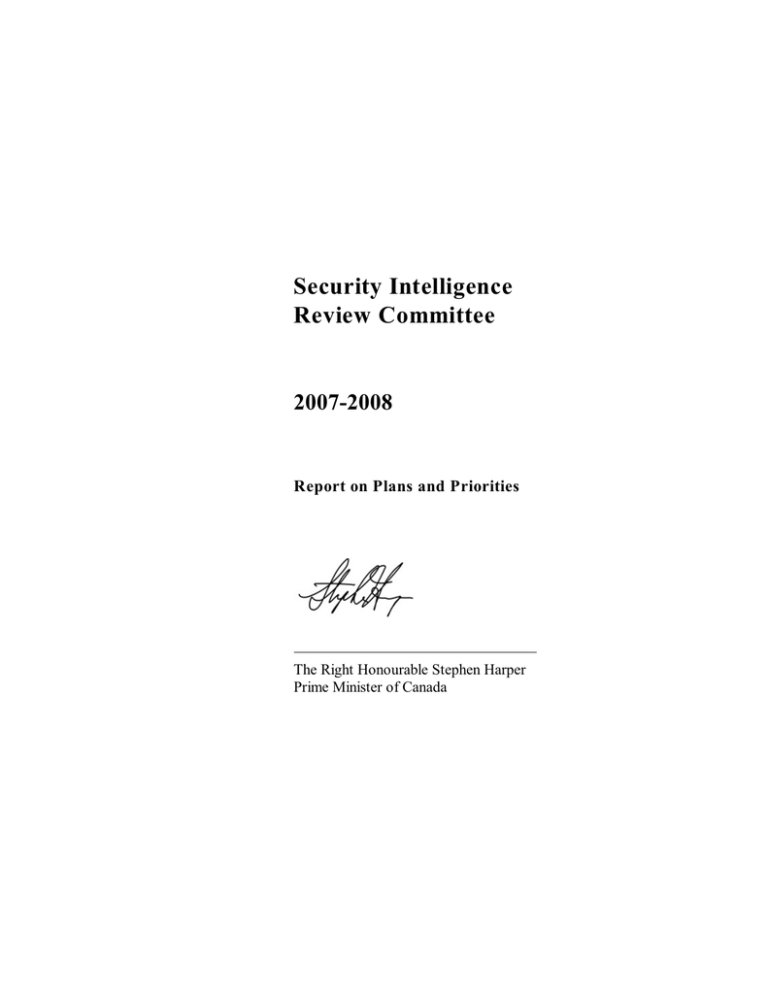
Security Intelligence Review Committee 2007-2008 Report on Plans and Priorities The Right Honourable Stephen Harper Prime Minister of Canada Table of Contents Section I - Overview Chair’s Message Management Representation Statement Summary Information Planning Environment Priorities 1 2 3 4 7 Section II - Analysis of Program Activities Strategic Outcome Reviews Complaints 10 10 12 Section III - Supplementary Information Organizational Information Tables 13 14 Section IV - Other Items of Interest Corporate Direction and Services Contact Information 16 17 SECTION I - OVERVIEW Chair’s Message I am pleased to submit SIRC's Report on Plans and Priorities (RPP) for 2007-2008. For 23 years, SIRC has ensured that the Canadian Security Intelligence Service acts within the law and respects Canadians' rights, while it carries out its mandate to guard against threats to our national security. SIRC’s role in achieving this balance – between protecting public safety and upholding fundamental rights and freedoms – is essential to a healthy, democratic society. In December, 2006, the Government received a comprehensive series of recommendations which could dramatically alter the review function in Canada. Mr. Justice O'Connor's report A New Review Mechanism for the RCMP's National Security Activities included proposals to expand SIRC's mandate to encompass the review of the national security activities of four federal departments and agencies: Citizenship and Immigration, Transport, the Financial Transactions and Reports Analysis Centre and Foreign Affairs and International Trade. While recognizing that the Government is in the process of formulating its response to these recommendations, SIRC stands ready to assume an expanded role. SIRC was also pleased to have an opportunity to appear before the House Standing Committee on Public Safety and National Security in November, 2006. Our Members believe that Parliament has an important role to play in the accountability framework for federal law enforcement and national security intelligence, so we welcomed this dialogue and hope to have regular and frequent contact with Parliamentarians in the future. I hope that SIRC’s RPP offers context and insight into our work. The Committee will continue to safeguard Canadians’ rights and freedoms, by ensuring real accountability and absolute respect for the rule of law. Gary Filmon, P.C., O.M. Chair Section I 1 Management Representation Statement I submit for tabling in Parliament, the 2007-2008 Report on Plans and Priorities (RPP) for the Security Intelligence Review Committee. This document has been prepared based on the reporting principles contained in Guide for the Preparation of Part III of the 2007-2008 Estimates: Reports on Plans and Priorities: • It adheres to the specific reporting requirements outlined in the Treasury Board Secretariat guidance; • It is based on the Department's Strategic Outcome and Program Activity Architecture that were approved by the Treasury Board; • It presents consistent, comprehensive, balanced and reliable information; • It provides a basis of accountability for the results achieved with the resources and authorities entrusted to it and; • It reports finances based on approved planned spending numbers from the Treasury Board Secretariat. Name: Susan Pollak Title: Executive Director 2 SIRC Summary Information Mission – To protect Canadians’ rights by ensuring that CSIS acts within the law. The Security Intelligence Review Committee (SIRC or the Committee) is a small, independent review body which reports to Parliament on the operations of the Canadian Security Intelligence Service (CSIS or the Service). It was established at the same time that CSIS was created in 1984, and derives its powers from the same legislation, the CSIS Act. The Committee is chaired by the Honourable Gary Filmon, P.C., O.M., who was appointed Chair on June 24, 2005. The other Members are the Honourable Raymond Speaker, P.C., O.C., the Honourable Baljit S. Chadha, P.C., the Honourable Roy Romanow, P.C., O.C., Q.C. and the Honourable Aldéa Landry, P.C., C.M., Q.C. All Members of the Committee are Privy Councillors, who are appointed by the Governor-in-Council after consultation by the Prime Minister with the Leaders of the Opposition parties. The Committee's raison d'être is to provide assurance to the Parliament of Canada and through it, to Canadians, that CSIS is complying with legislation, policy and Ministerial Direction in the performance of its duties and functions. In doing so, the Committee seeks to ensure that CSIS does not undermine the fundamental rights and freedoms of Canadians. The Committee is the only independent, external body equipped with the legal mandate and expertise to review the Service's activities, and is, therefore, a cornerstone for ensuring the democratic accountability of one of the Government's most powerful organizations. To provide this assurance, SIRC has two key Program Activities. The first is to conduct in-depth reviews of CSIS activities to ensure that they comply with the CSIS Act and the various policy instruments that flow from it, and with direction from the Minister. The second is to receive and inquire into complaints by any person about any action of the Service. The Service continues at all times to be accountable for current operations through the existing apparatus of government, specifically the Minister of Public Safety, the Inspector General of CSIS, central agencies and the Auditor General, Information Commissioner and Privacy Commissioner of Canada. Financial Resources ($ millions) Section I 2007-2008 2008-2009 2009-2010 $2.9 $2.9 $2.9 3 Human Resources (FTEs) 2007-2008 2008-2009 2009-2010 21 21 21 Agency Priorities Type Annual Report Ongoing Outreach Ongoing Liaison Ongoing Management Accountability Ongoing Quality Service Ongoing Planning Environment SIRC's planning environment has been influenced by several factors. In some cases, their full effect has yet to be determined, but there is no question that they will impact on the Committee's work. O’Connor Commission The findings and recommendations of the Commission of Inquiry into the Actions of Canadian Officials in Relation to Maher Arar could have a significant impact on SIRC’s work. In September, 2006, Mr. Justice O’Connor released his Report on the Events Relating to Maher Arar. This seminal report contained 23 recommendations on various aspects of the Royal Canadian Mounted Police’s and other agencies’ national security activities, such as investigative interaction with countries with questionable human rights records and the issue of Canadians detained abroad. SIRC was pleased to note that Mr. Justice O’Connor’s findings concerning CSIS’s activities with respect to Mr. Arar were consistent with its own conclusions on this matter. Three months later, Mr. Justice O’Connor released a companion report summarizing the work of his policy review. While nine of its 13 recommendations dealt with an independent, arm’s length review mechanism for the RCMP’s national security activities, it also proposed that independent review and complaints investigations be extended to encompass the same aspects of the Canada Border Services Agency, Citizenship and Immigration, Transport, the Financial Transactions and Reports Analysis Centre and Foreign Affairs and International Trade. 4 SIRC Mr. Justice O’Connor concluded that SIRC was the logical body to review the national security activities of the latter four entities. The report also recommended that ‘statutory gateways’ be enacted linking the three independent review bodies, in order to provide for integrated review and a centralized intake mechanism for complaints. Although SIRC has some concerns about the mandate and potential resource requirements of the proposed Integrated National Security Review Coordinating Committee, SIRC is in full agreement that any legislative impediments to greater coordination and information exchange among existing review bodies, should and must be addressed. It is now up to the Government to respond to Mr. Justice O’Connor’s recommendations. SIRC has stated that is ready to assume an expanded role, subject to a full and complete assessment of possible workload and resource implications. Proposed National Security Committee of Parliamentarians Proposed legislation to establish a National Security Committee of Parliamentarians died on the order paper when the previous Government fell. If the Government pursues this initiative, it remains unclear what impact the new Committee might have on the existing House and Senate committees. SIRC also has questions about its own relationship with the proposed Committee. While SIRC wants to establish a constructive relationship, it remains concerned about respective mandates and possible overlap and duplication. In addition, SIRC’s Members would have to address the legal conundrum of how to respond to Parliamentary requests for classified information, which could conflict with their Oaths of Secrecy and certain provisions of the CSIS Act. Major and Iacobucci Inquiries In May, 2006, the Government appointed Mr. Justice Major to lead an independent judicial inquiry into certain aspects of the 1985 Air India bombing. Seven months later, in response to the findings of the O’Connor Commission, the Government announced a second inquiry under former Supreme Court Justice Frank Iacobucci, to examine allegations made by three Canadian citizens that information provided by Canadian officials resulted in their detention and torture abroad. Although SIRC has not yet been officially contacted by either inquiry, it will offer its full and complete cooperation should it be approached for assistance. SIRC’s Complaints Program SIRC’s complaints program could be significantly affected by what is envisaged in Mr. Justice O’Connor’s policy review. For example, if “review” includes a recourse mechanism for Canadians identified on Transport’s no-fly list, this will have huge implications for the volume of complaints SIRC currently handles. Moreover, it is uncertain what impact the creation of an Integrated National Security Review Coordinating Committee would have on SIRC, if it includes one centralized complaints intake system for existing federal review bodies. SIRC Section I 5 would also need to learn and adapt to the new obligations imposed by the legislation governing Citizenship and Immigration, Transport, the Financial Transactions and Reports Analysis Centre and Foreign Affairs and International Trade. On a more practical level, SIRC’s automated complaints tracking software would need to be customized in order to monitor complaints emanating from these departments. New Rules of Procedure would also need to be approved by the Committee and Members would require training in interpreting and implementing these rules and in understanding any new legislative responsibilities. Management Accountability SIRC continues to make progress in this area, although as a small federal agency, without the luxury of dedicated staff responsible for financial and human resource management, SIRC must increasingly rely on external contractors, which diverts resources from its core functions. In fiscal year 2006-2007, SIRC developed a financial management framework to improve the allocation and monitoring of expenditures. The latter aspect has been delayed, however, by technical problems related to software transition, preventing SIRC from realizing the full benefits of a modernized and automated monitoring of its expenditures. In June, 2006, SIRC received the results of an independent, external audit, which was a condition of receiving additional funding approved by Parliament in 2004. This audit found that “SIRC’s internal processes are reasonably well-controlled, thus enabling SIRC to properly manage the expenditure of public funds with prudence and probity.” Coincidentally, Treasury Board Secretariat initiated another audit of hospitality and travel expenses of small federal agencies and included SIRC in its ambit. The results of this second audit are expected to be published by the Treasury Board Secretariat by the end of the current fiscal year. Following the successful development of a Management Action Plan and Risk Assessment in 2004-2005, SIRC participated in an on-line reporting exercise under the government-wide Management Accountability Framework. The results of this exercise are expected to be published by Treasury Board Secretariat by the end of the current fiscal year. SIRC also completed a threat and risk assessment by an accredited security officer from the Privy Council Office, to ensure compliance with the Management of Information Technology Security. SIRC has also enhanced physical security by upgrading its alarm system and is now in the process of further shielding its hearing room. Finally, SIRC notes that the Office of the Auditor General is considering examining the governance regime for small federal agencies. Given that the Chair and Committee Members are part-time Governor-in-Council appointments, any findings and recommendations could be of assistance in considering the expanded role for SIRC envisaged by Mr. Justice O’Connor. 6 SIRC Priorities Before discussing SIRC's priorities for 2007-2008, it is important to recognize that all of the Committee's resources are allocated to two Program Activities (which are described more fully in Section II). The first is to conduct in-depth reviews of CSIS activities to ensure that they comply with the CSIS Act and the various policy instruments that flow from it, and with direction from the Minister. The second is to receive and inquire into complaints by any person about any action of the Service. Many of SIRC’s priorities, such as the production of its Annual Report, are in effect an extension of SIRC's review and complaints programs. SIRC has identified five (5) priorities for 2007-2008, which are: 1) to produce an annual report and other high-quality communications material; 2) to pursue outreach activities; 3) to pursue liaison activities; 4) to undertake management accountability initiatives; and 5) to provide quality service to interested parties involved in the complaints process, through the provision of training and the sharing of best practices with Committee Members. Annual Report and Communications Material By reviewing past operations of the Service and investigating complaints, SIRC is able to make findings and recommendations designed to improve the Service's performance. The results of this work, edited to protect national security and privacy, are summarized in its Annual Report. In accordance with s. 53 of the CSIS Act, the Report must be submitted to the Minister of Public Safety "not later than September 30 in each fiscal year." The Minister then tables the Report in Parliament within fifteen days of its receipt. While SIRC’s Annual Report is the primary communications vehicle to the public, its website continues to attract a growing number of visitors. The number of “total successful requests” stood at 468,111 in January, 2007, which is a 68,000 increase from the same period the previous year. The Committee also continues to undertake a modest communications program, involving media interviews such as SIRC Chair Gary Filmon’s appearance on CTV’s Question Period in December, 2006, and the posting of speeches and other material on SIRC’s website. This is an ongoing activity which includes costs for writing, editing, translation, graphic design, printing services and work performed by professional consultants, as well as the electronic distribution of news releases and backgrounders to the media. Outreach In September, 2006, SIRC’s Chair gave a well-received speech to the Global Business Forum in Banff, Alberta and authored a companion op-ed published in the Calgary Herald. He was also one of the presenters at last year’s International Intelligence Review Agencies Conference and he has been invited to make a similar address to an International Symposium in June, 2007 which will focus on “Accountability of Intelligence and Security Agencies and Human Rights.” Section I 7 SIRC’s Executive Director and senior staff also expect to make several presentations over the coming year. This is an ongoing activity which includes the costs of travel and per diem costs incurred by Committee Members and SIRC staff, as well as some professional service contracts. Liaison In November, 2006, SIRC appeared before the House Standing Committee on Public Safety and National Security. Over the course of two hours, Committee Members had a wide-ranging discussion with Parliamentarians on Mr. Justice O’Connor’s Report on the Events Relating to Maher Arar as well as SIRC’s own report on this matter. This appearance also provided an opportunity to discuss SIRC’s Annual Report for 2005-2006 and its Main Estimates for 20062007. SIRC expects more frequent contact with Parliament in the coming year, especially if the Government re-introduces legislation to establish a National Security Committee of Parliamentarians. In addition, SIRC may need to liaise with the two judicial inquiries under Justices Major and Iacobucci, as well as participate in discussions with government officials concerning the recommendations of Mr. Justice O’Connor’s policy review. Finally, SIRC staff continue to actively participate in the Review Agencies Forum, which brings together representatives of the Commissioner for the Communications Security Establishment; the Inspector General, CSIS; and the Public Complaints Commission Against the RCMP. A fourth Forum was held in January, 2007 and at least two meetings are expected in the coming year. Resources associated with this ongoing priority are intended to cover the travel and per diem costs of Committee Members, plus the cost of preparing any briefing notes and other supporting material which may be prepared for liaison with these bodies. Management Accountability SIRC expects to respond to additional reporting requests from central agencies, associated with expenditure management reforms and the passage of the Accountability Act. In addition, it will be undertaking some staffing actions based on the new competency profiles and position descriptions developed in 2005-2006. It also intends to complete six corporate policies dealing with staffing. Finally, it stands ready to take whatever action is deemed necessary in response to Treasury Board Secretariat’s recent audit of small federal agencies and its evaluation of government-wide progress against the Management Accountability Framework. This is an ongoing activity. Resources identified under this priority will be allocated to contractors developing or implementing management accountability initiatives. 8 SIRC Quality Service As previously stated, SIRC anticipates significant changes to its complaints function, should the Government accept Mr. Justice O’Connor’s policy review recommendations. However, it would be premature to estimate possible workload and resource implications, until such time as the Government has announced its decision. Nevertheless, as a quasi judicial administrative tribunal, the Committee seeks to serve all interested parties, e.g. complainants, the respondent, the Canadian Human Rights Commission and other federal departments, in a timely and fair manner and in accordance with the rules of natural justice. The Committee achieves this objective through studying and receiving information on the best practices of other tribunals and adopting measures to improve the timely and efficient completion of SIRC’s investigations. In the coming year, Committee Members will be receiving training in administrative law and evidence and they will learn additional techniques for conducting a fair hearing. Resources associated with this priority are intended to cover the travel and per diem costs of Committee Members, hiring qualified speakers or trainers, plus the cost of preparing any briefing notes and other supporting material required by the Committee. Section I 9 SECTION II – ANALYSIS OF PROGRAM ACTIVITIES SIRC has only one strategic outcome, described below. In realizing this outcome, the Committee is seeking to ensure that at all times, CSIS acts within the law. This outcome is important to Canadians, because it helps to protect their fundamental rights and freedoms. In effect, SIRC is a cornerstone for ensuring the democratic accountability of one of the Government’s most powerful organizations. This outcome also contributes to one of the Government of Canada’s outcomes: specifically, a strong and mutually beneficial North American partnership. It is clear that Canada’s prosperity and security are closely linked to its relationship with its continental partners, all of whom are committed to the social well-being, economic success and the safety and security of their citizens. Security intelligence helps to safeguard this relationship, and the review function contributes to the effectiveness of these agencies. Strategic Outcome: To provide assurance to the Parliament of Canada and through it, to Canadians, that CSIS is complying with law, policy and Ministerial Direction in the performance of its duties and functions. Program Activity # 1: Reviews of CSIS Activities Financial Resources ($ millions) 2007-2008 2008-2009 2009-2010 $1.9 $1.9 $1.9 2007-2008 2008-2009 2009-2010 14 14 14 Human Resources (FTEs) The purpose of the Review Program is to conduct reviews of CSIS activities to ensure compliance. The expected result is changes or improvements to CSIS operational policies and procedures, where appropriate, based on the findings and recommendations which SIRC makes in its reviews. 10 SIRC SIRC has virtually unlimited power to review CSIS's performance of its duties and functions. With the sole exception of Cabinet confidences, SIRC has the absolute authority to examine all information concerning CSIS's activities, no matter how highly classified that information may be. It is important to note that the Committee examines CSIS's performance on a retrospective basis, that is to say, it examines the past activities of the Service. Its work is not intended to provide oversight of current CSIS operations. However, by preparing "snapshots" of highly sensitive CSIS activities over two decades, SIRC helps Parliament to determine whether CSIS is acting appropriately and within the law. SIRC's research program is designed to address a broad range of subjects. This approach allows the Committee to manage the inherent risk of being able to review only a small percentage of CSIS activities in any given year. In planning reviews for 2007-2008 and future years, SIRC will need to keep pace with CSIS’s increased level of activity, while also remaining prepared to adjust planned activities to respond to unforseen events. This year, SIRC plans to complete eight reviews, a slight decrease from the past year, which will examine a broad range of CSIS activities. Decisions on review topics continue to be undertaken based on domestic and world events; issues, priorities and concerns identified by Canadians and Parliament; past reviews; and existing and emerging CSIS activities. As part of its review program, the Committee visits CSIS regional offices on a rotating basis to examine how Ministerial direction and CSIS policy affect the day-to-day work of investigators in the field. These trips afford Committee Members with an opportunity to meet with senior CSIS staff, receive briefings on regional issues and communicate the Committee's focus and concerns. Regional visits also permit the Committee to meet with experts on a broad range of subjects. The Committee intends to visit at least two CSIS regional offices in 2007-2008. CSIS also maintains a number of posts outside Canada. In order to monitor effectively the application of the Service's information-sharing arrangements with foreign agencies, SIRC conducts regular reviews of these Foreign Officer (FO) posts abroad. At least one FO post will be included in the 2007-2008 research plan. “Reviews of CSIS Activities” is an ongoing activity which includes salary costs and training for staff, monthly meetings attended by Committee Members, their travel expenses and per diems. It also includes ground transportation on a daily basis between SIRC's office and CSIS headquarters. Several performance measurements are used to assess its effectiveness. One measure is whether the research plan approved by the Committee is completed in its entirety. Another measure concerns whether CSIS acts on the recommendations contained in SIRC's reviews. Other measures include the number and scope of reviews relative to resources; how frequently different aspects of CSIS’s operations are reviewed, given that SIRC cannot review each on an annual basis; and feedback on the quality of reviews from those privy to receive them. Section II 11 Program Activity # 2: Complaints Financial Resources ($ millions) 2007-2008 2008-2009 2009-2010 $1.0 $1.0 $1.0 2007-2008 2008-2009 2009-2010 7 7 7 Human Resources (FTEs) The purpose of the Complaints Program is to investigate complaints and conduct investigations in relation to: • complaints "with respect to any act or thing done by the Service" as described in the CSIS Act; • complaints about denials of security clearances to federal government employees and contractors; • referrals from the Canadian Human Rights Commission in cases where the complaint relates to the security of Canada; and • Minister's reports in respect of the Citizenship Act. The Committee has no control over the number of complaints it receives in any given year. Their volume and complexity can have a significant impact on SIRC's capacity to fulfill its mandate. Because complaints are very time consuming, small changes in their numbers can significantly affect the Committee's budget and operations. “Complaints” is an ongoing activity. It includes salary costs and training for staff, complaint hearings presided over by Committee Members, their travel expenses and per diems, as well as costs for simultaneous translation, court reporters, plus funding to obtain outside legal advice. One measure of its effectiveness is whether or not the Committee's decisions are subsequently challenged in Federal Court. SIRC has also adopted a standard that all written complaints are formally acknowledged within seven days of their receipt and that within 60 days, all complaints should either be resolved to the complainant's satisfaction, determined to be without foundation and closed, or elevated to the status of an in-depth Committee investigation. 12 SIRC SECTION III – SUPPLEMENTARY INFORMATION Organizational Information Links to Government of Canada Outcomes ($ millions) Budgetary 2007-2008 Operating Gross Budgetary Expenditures Net Budgetary Expenditures Total Planned Spending Strategic Outcome: Contributes to the achievement of the Government of Canada’s “A Strong and Mutually Beneficial North American Partnership” outcome area. Review CSIS activities 1.9 1.9 1.9 1.9 Complaints 1.0 1.0 1.0 1.0 Total 2.9 2.9 2.9 2.9 Section III 13 Table 1: Planned Spending and Full Time Equivalents ($ millions) Reviews Forecast Planned Planned Planned Spending Spending Spending Spending 2006-2007 2007-2008 2008-2009 2009-2010 1.6 1.6 1.6 1.6 1 1 1 1 2.6 2.6 2.6 2.6 2.6 2.6 2.6 2.6 Treasury Board Vote 15 Employee Benefit Plan (EB) 0.3 0.3 0.3 0.3 Total Planned Spending 2.9 2.9 2.9 2.9 Total Planned Spending 2.9 2.9 2.9 2.9 Plus: Cost of services received without charge 0.2 0.2 0.2 0.2 Net cost of Program 3.1 3.1 3.1 3.1 Full Time Equivalents 20 21 21 21 Complaints Budgetary Main Estimates (gross) Non-Budgetary Main Estimates (gross) Less: Re-spendable revenue Total Main Estimates Adjustments: Supplementary Estimates: Supps “A” Less: Non-Respendable revenue 14 SIRC Table 2: Voted and Statutory Items Listed in Main Estimates ($ millions) Vote or Statutory Item 2007-2008 Truncated Vote or Statutory Wording Current Main Estimates Previous Main Estimates 30 Operating expenditures 2.6 2.6 (S) Contributions to employee benefit plans 0.3 0.3 Total Agency 2.9 2.9 Table 3: Services Received Without Charge ($ millions) 2007-2008 Accommodation provided by Public Works and Government Services Canada (PWGSC) 0.2 Contributions covering employers' share of employees’ insurance premiums and expenditures paid by TBS (excluding revolving funds) 0.1 Total 2007-2008 Services received without charge 0.3 Table 4: Resource Requirement by Branch or Sector ($ millions) 2007-2008 Reviews Reviews 1.9 Complaints Total Section III Complaints 1.9 Total Planned Spending 1.9 1 1 1 2.9 15 SECTION IV – OTHER ITEMS OF INTEREST Corporate Direction and Services Because “Corporate Direction and Services” is not displayed in the Main Estimates as a separate program activity, it was not discussed in Section II. Resources are simply included as part of the overall allocation for those activities. However, because Corporate Direction and Services consumes roughly 21 percent of the organization’s total resources and covers a number of activities and services which are essential to the smooth functioning of the organization, SIRC is providing the following breakdown. Financial Resources ($ millions) 2007-2008 2008-2009 2009-2010 $0.6 $0.6 $0.6 2007-2008 2008-2009 2009-2010 3 3 3 Human Resources (FTEs) All of the costs associated with monthly meetings attended by Committee members, their per diems, plus travel and accommodation costs, are captured under this activity. So are the initiatives related to the Modern Comptrollership priority discussed in Section I . Corporate Direction and Services also includes ongoing refinements to SIRC’s website, as well as the general informatics support required to maintain internal computing systems. In addition, financial and human resource management services which are not provided to SIRC by the Privy Council Office, are funded through this activity. Finally, the salaries of two executives providing corporate direction and one administrative head who supports them, are also included. 16 SIRC Contact Information Security Intelligence Review Committee P.O. Box 2430 Station “D” Ottawa, Ontario K1P 5W5 Telephone: Facsimile: Internet: E-Mail: (613) 990-8441 (613) 990-5230 www.sirc-csars.gc.ca ellardm@sirc-csars.gc.ca Legislation Administered: The Canadian Security Intelligence Service Act Section IV 17
